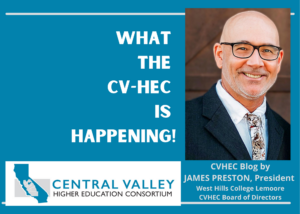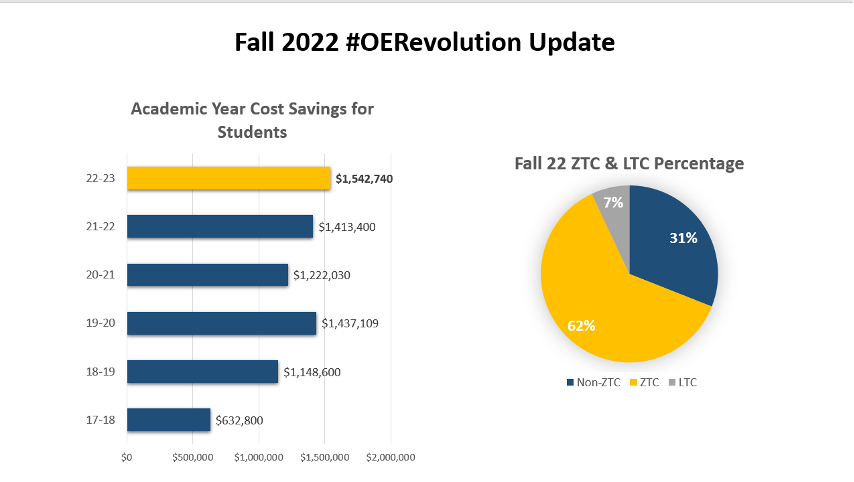WHAT THE CV-HEC IS HAPPENING BLOG (September 2022): The ZTC/OER Movement
Let’s Join the OERevolution with
ZTC programs, Central Valley!
By JAMES PRESTON, President
West Hills College Lemoore
CVHEC Board of Directors
The California Community College Chancellor’s Office recently announced it is launching the Zero Textbook Cost (ZTC) Program and supporting the system with $115 million to do the work in what we term the “OERevolution” (Open Educational Resources).

While the details are still rolling out in series of webinars, the Central Valley Higher Education Consortium CVHEC is forming a ZTC Taskforce to review/advise how its community college district members can access these funds to implement the program.
Each college in the system will receive a $20,000 planning grant designed to help colleges develop a team and devise a plan. The remaining funds will be available for colleges to fund ZTC degrees at their college. Applications are now available.
For the past six years, you have been hearing the OER and ZTC acronyms as our state community college system has been discussing the possibilities of a world without expensive textbooks. The time is now Central Valley to lean into the OERevolution! But before I explain its ingredients, let’s start with some basic definitions:
- Open Educational Resources (OER) are free, openly licensed and accessible materials that faculty can retain, revise, remix, reuse, revise and redistribute. OER materials come in many forms such as open textbooks, videos, articles and ancillary support materials.
- When creatively combined into a Canvas course shell, OER create what we now know as a Zero Textbook Cost (ZTC) course. Teamwork between discipline faculty, an area administrator, library or instructional design support and student services personnel, along with the financial support for people to collaborate, can quickly move things from a ZTC course to a ZTC degree.
- Add in a dose of creativity, strategy, policy, equity and guided pathways thinking and you are on your way to a full OERevolution!
Three Wins When You Join the OERevolution!
In 2016 , West Hills College Lemoore received a $100,000 grant from the Achieving the Dream (ATD) network to create a Zero Textbook Cost (ZTC) degree for an Associate in Arts for
Transfer (AA-T) in Elementary Education and it started the college on our campus’ OERevolution journey!
Initially, West Hills College Lemoore jumped into the OERevolution as a way to eliminate textbook cost barriers for students; however, what started as a revolution against textbook publishers and outrageous prices quickly turned into an evolution of teaching and learning as faculty utilized OER materials in creative and powerful ways.
Thousands of hours of teamwork, a few additional grants and six years later West Hills College Lemoore has saved students over $8 million dollars, evolutionized teaching and learning and currently offers 62 percent of our courses in the ZTC format with a dozen degrees and certificates that students can complete without any textbook costs!
The ZTC program, like any new initiative or work, finds our Central Valley colleges in various stages while continuously fighting with competing priorities, but let me frame for you three guaranteed wins if you join the OERevolution!
Win #1: Affordability and Access
We have been fighting the affordability fight as a system for the past decade and are starting to see great movement in food insecurity, housing insecurity, financial aid reform and efforts to close the digital divide. These are all critical movements, but let’s talk about student success and how hard it is for students to succeed in their courses if they can’t afford the learning materials.
For years we at West Hills College Lemoore tried creative solutions like putting a textbook on reserve in the library or creating textbook checkout programs. Our college ran a very “successful” textbook checkout program for one of our categorical programs that checked out 250 textbooks a semester for 10 years which saved students about $500,000 over ten years (approximating $100 a textbook). But in the first year that we launched our OERevolution, we were able to save students $632,800 in textbook costs. Simple math: in one year with OER, West Hills College Lemoore saved students what took 10 years with other creative approaches.
Similarly, the California Community College Chancellor’s Office invested $5 million into the pilot program for ZTC degrees in 2016. West Hills College Lemoore served as the Co-Technical Assistance Provider (TAP) for this program and the savings for students were staggering: the 37 ZTC degrees and certificates that were created across the state saved students over $40 million dollars.
This chart shows the progress of West Hills College Lemoore the past six years and highlights the powerful combination of savings and Day One access for our students to their OER learning materials.

Win #2: Teaching and Learning
One major flaw in our community college system is that our new full-time and part-time faculty come into our system with minimal teacher preparation.
For decades, the onboarding of an individual who meets minimum qualifications with a M.A. degree or vocational experience in their discipline — but no teacher training — amounted to receiving a course outline, a sample syllabus and the course textbook with publisher materials. If your institution utilizes this formula, you most likely end up with a teacher who will lean heavily on the textbook and publisher materials out of pure survival the first few years in the classroom until they have had the chance to gain experience, receive mentoring and engage in professional development.
The move to Open Educational Resources at West Hills College Lemoore has led to an evolution in teaching and learning as the faculty focus has been freed from textbook dependency and shifted from teaching “chapters” to teaching concepts. Faculty have diversified their curriculum and identified relevant and engaging OER materials to create their ZTC course shells in Canvas.
One of our most recent examples is our math faculty who recently shifted from Pearson’s MyMathLab ($120 access code) to MyOpenMath (MOM).
MOM is an open and free product created by a group of community college math instructors in concert with some programmers and has resulted in high-quality open Math courses in the Canvas Commons with ancillary materials comparable to publisher materials.
Our math faculty have taken the base model of the MOM courses and added their own personalized videos, lecture notes and even programmed in some quizzes, tests and other support materials. Innovation and collaboration have become the norm as faculty use a “base model” course shell and then add in their own materials to personalize it for their students.
Across our college, you no longer hear faculty stating they are “covering chapter three this week.” Instead they are talking about concepts and themes.
Win #3: Diversity, Equity, Inclusion and Access!
For years we have heard stories, completed surveys and conducted focus groups at our colleges that informed us that students either don’t purchase the textbooks because of cost, buy textbooks later in the semester when they are able to gather up funds, or just get creative and try to find workarounds to purchasing a textbook which takes time and compromises the quality of materials.
The most compelling win for OER is equitable access to course materials for all students on Day One of the class. Thanks to the ZTC course model, the majority of our faculty are able to open up their courses with introductory content and access to learning materials a week before the class starts so students are ready to succeed from Day One.
The beginnings of an OERevolution are grounded in faculty working together with their OER librarian or instructional designer and fellow faculty to identify diverse, engaging and quality materials aligned to their outcomes.
The next level of the OERevolution can also include open pedagogy where students are also gathering and identifying materials for a course and faculty content creation where faculty help fill the gaps and create content to support learning either in the form of videos, articles or textbooks.
Our most recent college example of faculty innovation is a new textbook that was co-written by a team of faculty for an Introduction to Ethnic Studies course. This free and open textbook serves as a guide and the course shell includes additional learning and engagement materials.
Co-author Dr. Vera Kennedy proclaims, “We are excited to share our new OER book with original content titled Our Lives: An Ethnic Studies Primer with students and faculty. The text was developed as a stand-alone resource for Introduction to Ethnic Studies courses. However, students and faculty wanting discipline-specific voices or perspectives may choose the book as a supplemental resource.”
The textbook is available in three online format that are listed below and you can see how with just a click of a link our students have Day One access to their material:
- PDF version
- Pressbooks version
- LibreTexts version
Scaling Up the OERevolution!
West Hills College Lemoore, through the TAP role with the pilot ZTC program, offered OER bootcamps and professional development for faculty and delivered strategic sessions for college teams to address institutional elements around OER such as building infrastructure and integration of ZTC and OER through shared governance, policy and campus plans.
Our campus looks forward to working with CVHEC to provide training, support and resources to help our Central Valley colleges continue their OERevolution. I invite you to check out our story and a plethora of resources at our OER website: https://www.westhillscollege.com/lemoore/oer/.
OER Embraced – California community colleges implement zero–textbook–cost (Inside Higher Ed 09/19/19)




These are all spectacular wins, and I especially appreciate the evolution of teaching and learning and what it will do for the quality of experience for our students’ educations…. their ROI!
Thank you for sharing the example from your faculty. Impressive!